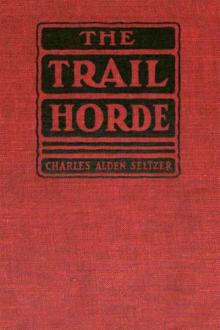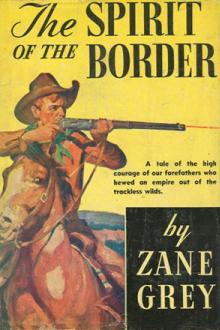The Border Legion, Zane Grey [books for 7th graders txt] 📗

- Author: Zane Grey
Book online «The Border Legion, Zane Grey [books for 7th graders txt] 📗». Author Zane Grey
“How old are you?”
It was only in her height and development that Joan looked anywhere near her age. Often she had been taken for a very young girl.
“I'm seventeen,” she replied. This was not the truth. It was a lie that did not falter on lips which had scorned falsehood.
“Seventeen!” he ejaculated in amaze. “Honestly, now?”
She lifted her chin scornfully and remained silent.
“Well, I thought you were a woman. I took you to be twenty-five—at least twenty-two. Seventeen, with that shape! You're only a girl—a kid. You don't know anything.”
Then he released her, almost with violence, as if angered at her or himself, and he turned away to the horses. Joan walked toward the little cabin. The strain of that encounter left her weak, but once from under his eyes, certain that she had carried her point, she quickly regained her poise. There might be, probably would be, infinitely more trying ordeals for her to meet than this one had been; she realized, however, that never again would she be so near betrayal of terror and knowledge and self.
The scene of her isolation had a curious fascination for her. Something—and she shuddered—was to happen to her here in this lonely, silent gorge. There were some flat stones made into a rude seat under the balsam-tree, and a swift, yard-wide stream of clear water ran by. Observing something white against the tree, Joan went closer. A card, the ace of hearts, had been pinned to the bark by a small cluster of bullet-holes, every one of which touched the red heart, and one of them had obliterated it. Below the circle of bulletholes, scrawled in rude letters with a lead-pencil, was the name “Gulden.” How little, a few nights back, when Jim Cleve had menaced Joan with the names of Kells and Gulden, had she imagined they were actual men she was to meet and fear! And here she was the prisoner of one of them. She would ask Kells who and what this Gulden was. The log cabin was merely a shed, without fireplace or window, and the floor was a covering of balsam boughs, long dried out and withered. A dim trail led away from it down the cañon. If Joan was any judge of trails, this one had not seen the imprint of a horse track for many months. Kells had indeed brought her to a hiding place, one of those, perhaps, that camp gossip said was inaccessible to any save a border hawk. Joan knew that only an Indian could follow the tortuous and rocky trail by which Kells had brought her in. She would never be tracked there by her own people.
The long ride had left her hot, dusty, scratched, with tangled hair and torn habit. She went over to her saddle, which Kells had removed from her pony, and, opening the saddlebag, she took inventory of her possessions. They were few enough, but now, in view of an unexpected and enforced sojourn in the wilds, beyond all calculation of value. And they included towel, soap, toothbrush, mirror and comb and brush, a red scarf, and gloves. It occurred to her how seldom she carried that bag on her saddle, and, thinking back, referred the fact to accident, and then with honest amusement owned that the motive might have been also a little vanity. Taking the bag, she went to a flat stone by the brook and, rolling up her sleeves, proceeded to improve her appearance. With deft fingers she rebraided her hair and arranged it as she had worn it when only sixteen. Then, resolutely, she got up and crossed over to where Kells was unpacking.
“I'll help you get supper,” she said.
He was on his knees in the midst of a jumble of camp duffle that had been hastily thrown together. He looked up at her—from her shapely, strong, brown arms to the face she had rubbed rosy.
“Say, but you're a pretty girl!”
He said it enthusiastically, in unstinted admiration, without the slightest subtlety or suggestion; and if he had been the devil himself it would have been no less a compliment, given spontaneously to youth and beauty.
“I'm glad if it's so, but please don't tell me,” she rejoined, simply.
Then with swift and business-like movements she set to helping him with the mess the inexperienced pack-horse had made of that particular pack. And when that was straightened out she began with the biscuit dough while he lighted a fire. It appeared to be her skill, rather than her willingness, that he yielded to. He said very little, but he looked at her often. And he had little periods of abstraction. The situation was novel, strange to him. Sometimes Joan read his mind and sometimes he was an enigma. But she divined when he was thinking what a picture she looked there, on her knees before the bread-pan, with flour on her arms; of the difference a girl brought into any place; of how strange it seemed that this girl, instead of lying a limp and disheveled rag under a tree, weeping and praying for home, made the best of a bad situation and unproved it wonderfully by being a thoroughbred.
Presently they sat down, cross-legged, one on each side of the tarpaulin, and began the meal. That was the strangest supper Joan ever sat down to; it was like a dream where there was danger that tortured her; but she knew she was dreaming and would soon wake up. Kells was almost imperceptibly changing. The amiability of his face seemed to have stiffened. The only time he addressed her was when he offered to help her to more meat or bread or coffee. After the meal was finished he would not let her wash the pans and pots, and attended to that himself.
Joan went to the seat by the tree, near the camp-fire. A purple twilight was shadowing the cañon. Far above, on the bold peak the last warmth of the afterglow was fading. There was no wind, no sound, no movement. Joan wondered where Jim Cleve was then. They had often sat in the twilight. She felt an unreasonable resentment toward him, knowing she was to blame, but blaming him for her plight. Then suddenly she thought of her uncle, of home, of her kindly old aunt who always worried so about her. Indeed, there was cause to worry. She felt sorrier for them than for herself. And that broke her spirit momentarily. Forlorn, and with a wave of sudden sorrow and dread and hopelessness, she dropped her head upon her knees and covered her face. Tears were a relief. She forgot Kells and the part she must play. But she remembered swiftly—at the rude touch of his hand.
“Here! Are you crying?” he asked, roughly.
“Do you think I'm laughing?” Joan retorted. Her wet eyes, as she raised them, were proof enough.
“Stop it.”
“I can't help—but cry—a little. I was th—thinking of home—of those who've been father and mother to me—since I was a baby. I wasn't crying—for myself. But they—they'll be so miserable. They loved me so.”
“It won't help matters to cry.”
Joan stood up then, no longer sincere and forgetful, but the girl with her deep and cunning game. She leaned close to him in the twilight.
“Did you ever love any one? Did you ever have a sister—a girl like me?”





Comments (0)